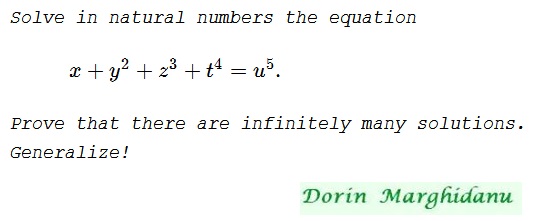Elegance in Integers by Dorin Marghidanu
Problem

Solution
There's an obvious trivial solution, $x=y=z=t=u=0.$ Let's find a nontrivial solution. Since $4^{24}+4^{24}+4^{24}+4^{24}=4^{25},$ we conclude that
$4^{24}+(4^{12})^2+(4^{8})^3+(4^{6})^4=(4^{5})^5$
so that $(4^{24},4^{12},4^{8},4^{6},4^{5})$ is one set of solutions.
In general, if the quintet $(x_0,y_0,z_0,t_0,u_0)$ solves the given equation, i.e., satisfies $x_0+y_0^2+z_0^3+t_0^4=u_0^5,$ then multiplying by $k^{60},$ $k\in\mathbb{N},$ gives
$k^{60}\cdot x_0+(k^{30}\cdot y_0)^2+(k^{20}\cdot z_0)^3+(k^{15}\cdot t_0)^4=(k^{12}\cdot u_0)^5$
such that the quintet $(k^{60}x_0,\,k^{30}y_0,\,k^{20}z_0,\,k^{15}t_0,\,k^{12}u_0)$ is also a solution for any $k\in\mathbb{N}.$
Generalization
Given a natural number $n\ge 1.$ Solve in natural numbers the equation
$x_1+x_2^2+x_3^3+\ldots+x_n^n=y.$
Prove that there are infinitely many solutions.
Solution
A trivial solution $x_1=x_2=\ldots=x_n=y=0$ is obvious. For a nontrivial solution note that
$\underbrace{n^{n!}+n^{n!}+\ldots+n^{n!}}_{n\text{ terms}}=n\cdot n^{n!}$
which is equivalent to
$n^{n!}+(n^{\frac{n!}{2}})^2+(n^{\frac{n!}{3}})^3\ldots+(n^{\frac{n!}{n}})^n=n^{n!+1},$
making the $n-tuple$
$(x_1,x_2,x_3,\ldots,x_n,y)=(n^{n!},\,n^{\frac{n!}{2}},\,n^{\frac{n!}{3}},\ldots,n^{\frac{n!}{n}},\,n^{n!+1}),$
a solution. We get more solutions with any $k\in\mathbb{N}:$
$(k^{n!}x_1,\,k^{\frac{n!}{2}}x_2,\,k^{\frac{n!}{3}}x_3,\ldots,k^{\frac{n!}{n}}x_n,\,k^{n!}y).$
Remark
Due to the presence of the linear term on the left, both the problem and the generalization are in fact trivial. For the problem, $y,z,t$ could be chosen arbitrarily and $u$ sufficiently large to ensure $u^5-t^4-z^3-y^2\gt 0.$ The problem becomes less trivial when the linear term is left out:
Solve in natural numbers the equation
$y^2+z^3+t^4=u^5.$
Then the solution above can be adapted: since $3^{24}+3^{24}+3^{24}=3^{25},$ $(3^{12},3^{8},3^{6},3^5)$ serves a solution to the equation.
The problem admits generalizations different from the above. For example,
Let $m,n,p$ be natural numbers greater than 1. Find $q$ such that the equation below has solutions in natural numbers
$y^m+z^n+t^p=u^q.$
Since $3^{mnp}+3^{mnp}+3^{mnp}=3^{mnp+1},$ $(3^{np})^m+(3^{mp})^n+(3^{mn})^p=3^{mnp+1}$ and the problem is to find the factors of $mnp+1.$ For example, with $m=2,$ $n=4,$ and $p=6,$ $mnp+1=49,$ making the question of finding natural solutions to $y^2+z^4+t^6=u^7$ meaningful. $(3^{24},3^{12},3^{8},3^7)$ is one solution to the latest equation.
Acknowledgment
Dorin Marghidanu has kindly shared the above problem on the CutTheKnotMath facebook page, along with a solution of his and a generalization.
![]()
|Contact| |Up| |Front page| |Contents| |Arithmetic|
Copyright © 1996-2018 Alexander Bogomolny73753019
